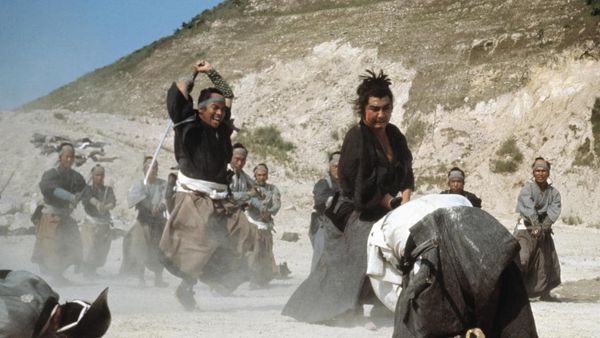Eye For Film >> Movies >> Lone Wolf And Cub: Baby Cart To Hades (1972) Film Review
Lone Wolf And Cub: Baby Cart To Hades
Reviewed by: Jennie Kermode

By the third installment of the Baby Cart/Sword Of Vengeance/Lone Wolf And Cub series - the last that he directed - Kenji Misumi is running into a familiar problem: how does he keep on satisfying the series' fans? When what excited them about the first two films was in large part their inventiveness, how can he outdo what he has already done? In seeking to overcome this he has produced some superb set pieces, but he has also fallen prey to the One Louder approach. Hero Itto Ogami (Tomisaburô Wakayama) must fight more people, more bloodily. There are also more rape scenes, and for all that the actresses involved try to communicate sincere distress, there's no getting around the fact that they are shot in a way intended to titillate.
Some of this stems from the original manga, of course - Kazuo Koike was facing a similar problem. There is some compensation for the viewer in Misumi's much improved action direction - he has clearly learned from the earlier films and is also better equipped. This gives Wakayama more opportunity to show what he can do, with his skill as a swordsman really coming to the fore. Seeing the speed of his draw and his remarkable balance makes his success in scenes where he is vastly outnumbered more believable. There is a little bit of the usual problem with enemies coming forward one by one when they might overwhelm him by attacking at once, but some of this can reasonably be attributed to fear at the proximity of a man who moves like a demon.

A demon is, of course, exactly what Itto believes himself to be, and at this stage in his journey he begins to meet others in similar situations. We first meet ronin Magomura Kanbei (Gô Katô) as he commits what seems like an act of mercy, followed swiftly by an act of cruelty. He's a complex character and his fate becomes intertwined with Itto's, though we must wait until the end to understand what drives him.
Itto's heroism, in between jobs as an assassin, is more straightforward. Here he agrees to undergo torture in order to save a brutalised young woman from being forced to work in a brothel. There's some nice shibari bondage work on display for those with an interest in such things. It is not the young woman's story which this draws him into, however, but that of the brothel madam and her people, bo-hachi-mon "who have forgotten all eight virtues." Impressed by his toughness, they decide to hire him, and he finds himself on a dangerous mission.
By this stage in the series, though it's still less than a year since the first film, Itto's infant son Daigoro (Akihiro Tomikawa) is beginning to walk and talk properly. He doesn't get as much to do as one might hope, though he continues to charm women, but Misumi has fun putting him in classic poses (derived as much from westerns as from the samurai genre itself) and letting him use his trademark sullen glare to good effect. This provides material for cutaways that help in building atmosphere. Again, the director makes good use of landscape to give key confrontations the epic quality that the series deserves, as important as the detail in costume and set decoration that binds it to its historical roots.
Though it's not the strongest of the series overall, Baby Cart To Hades will appeal to fans of the action side of the genre, and its otherwise simple narrative presents more moral complexity than one might expect. As other ronin complain about the hardships their lifestyle entails, Daigoro seems ready to embrace the fate his father has chosen for him - and the baby cart has some way yet to roll.
Reviewed on: 14 Mar 2017
















